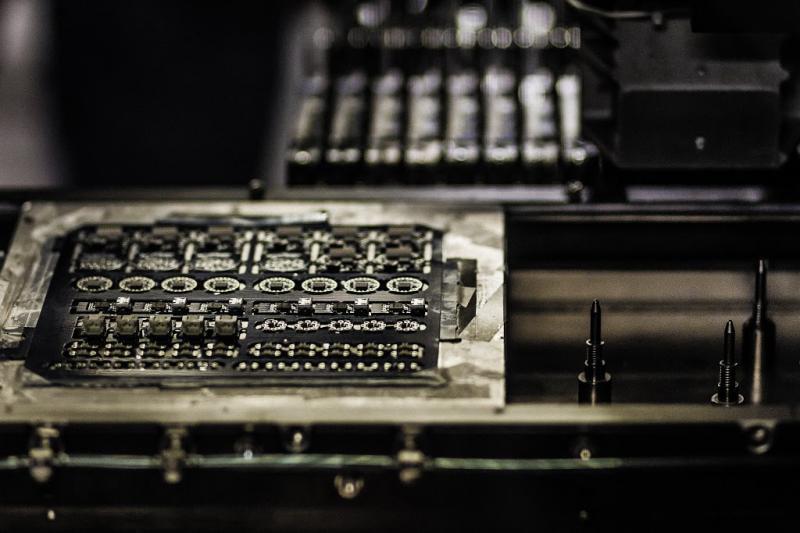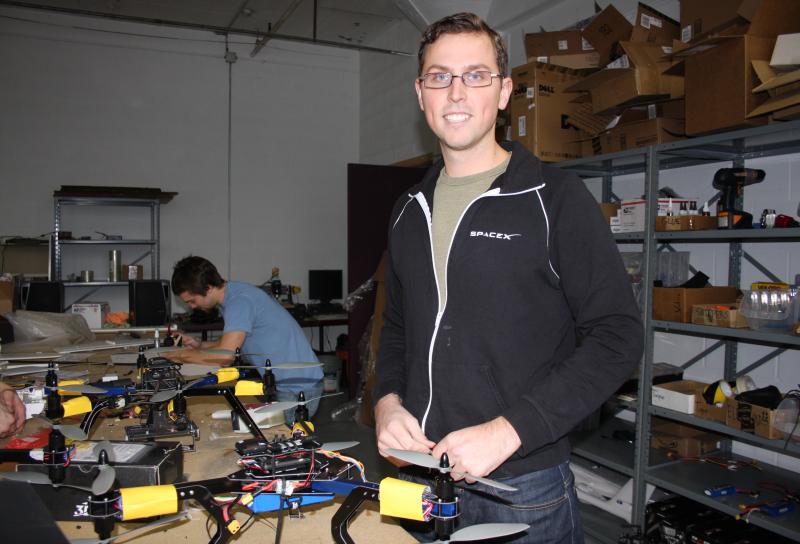Kickstarting a start-up
Ken Burns is searching his desk drawer for a bit of history. He digs until he finds the very first circuit he built by hand in his basement a couple of years ago. It's one of several quarter-sized circuit boards covered with miniature electronic components. He says soldering the miniature components, “was very frustrating," but he persevered until he had a functioning circuit board ready for testing.

Up until six months ago, Burns worked for a local electronics and technology company, investing his spare time building miniature electronics components for the consumer market. He decided to test his concept through an online fundraising campaign on Kickstarter.
He says the response from Kickstarter, "really proved that there’s potentially a business here, a market for this -- and that’s what gave me the confidence to go out on my own.”
Burns set out to raise $10,000. His total take turned out to be $110,000, enough to move production out of his basement and onto the fifth floor of a former B.F.Goodrich factory at Akron’s Canal Place. He demonstrates the machine he now uses to assemble his once hand-built TinyCircuits.
From hand-built to machine-made circuit boards
 While it used to take Burns 8 hours to make a board, it now takes half a second for the machine to pick up a part smaller than a sesame seed and delicately place it on the blank circuit board. When it’s finished another machine heats the boards to solder components in place. While it used to take Burns 8 hours to make a board, it now takes half a second for the machine to pick up a part smaller than a sesame seed and delicately place it on the blank circuit board. When it’s finished another machine heats the boards to solder components in place.
The final product at Burns’ mini-factory is a mini-computer called an Arduino. The Arduino was designed by Italian engineering students back in 2006. The open-source platform has since become the workhorse of the high-tech maker movement, providing easy to use electronics that can turn nearly any object into a programmable robot.
Burns and TinyCircuits miniaturize the cell-phone sized Arduino board to the size of a quarter. He customizes it with all the gadgets an electronics geek could want.
“It’s almost like a Lego where it just plugs together. But then we also have things like GPS, Wi-Fi, Bluetooth, different sensors, gyros, accelerometers… so it’s really kind of electronic building blocks for a maker or hobbyist or even a design company to put something together very quickly.”
Arduinos, says Burns, are used by artists to create interactive installations, by scientists to track animals fitted with sensors, and by hobbyists who hack everything from remote control cars to coffee makers.
Drones flying off the shelves
Next door, another start-up has found another use for Arduinos.
Jeff Taylor is the founder of Event38. Taylor and his crew build and sell, "small unmanned aircraft that come in the form of a helicopter or an airplane.”
In other words, drones.
His hexicopter,"is like a helicopter but instead of one big rotor, it has six small rotors and six small motors.”
We take it for a spin in the hallway, the old factory’s steam pipes pounding as the copter boots up.
Taylor’s hexicopters run around $1,500. It’s outfitted with a camera, and his main customers -- developers and farmers -- use them to survey properties. His small crew builds them by hand and installs the electronics in a high-tech version of Santa’s workshop.
A new era in Akron manufacturing
Back at TinyCircuits, Ken Burns and his five employees struggle to keep up with demand.
He says sales haven’t been an issue so far. Rather, "it’s been getting the manufacturing under control and coming out with new products." Burns has about eight new products coming out in the next month, "different sensors and add-ons that people have really been asking for.”
TinyCircuits will soon be selling its wares at MicroCenters stores across the country.
 Burns has been filling up his credit cards building the business, but that's about to change. He says the company is on target for December to get into the black, "which is pretty rare for a start-up." Burns has been filling up his credit cards building the business, but that's about to change. He says the company is on target for December to get into the black, "which is pretty rare for a start-up."
Burns is proud that his boot-strap approach to electronics manufacturing is housed in old tire factory.
“It’s kind of an interesting mix of Akron’s history with Akron’s future.”
In one corner of the cavernous factory, TinyCircuits has taken root, in the new age of innovation. |